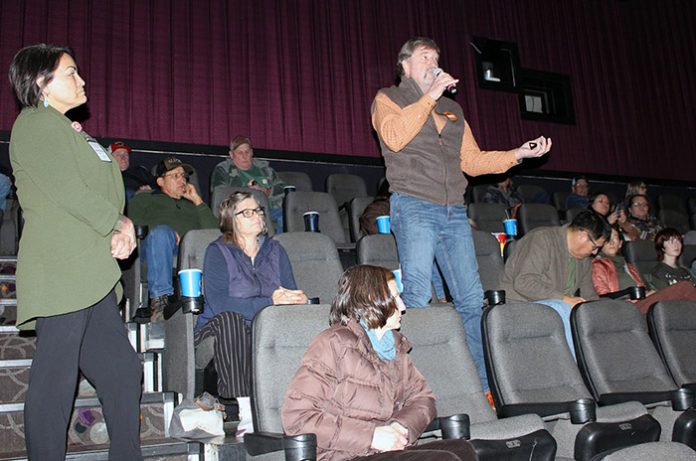
With more than 200 people attending, a free one-time screening of the regenerative farming documentary “Common Ground” was held Feb. 7 at the Wildhorse Resort & Casino Cineplex.
The documentary showcases the “Regenerative Movement” pioneers who are creating a food system that produces nutritionally dense food while balancing the climate and bringing ecosystems back to life. Regenerative agriculture focuses on improving the health of soil that has been degraded by using heavy machinery, fertilizers, herbicides and pesticides.
Paula Wallis, Tiichám Conservation District secretary/treasurer and Confederated Tribes of the Umatilla Indian Reservation (CTUIR) member, said she, CTUIR Board of Trustees Member At Large Lisa Ganuelas, Deputy Executive Director Jonetta Herrera and Farm Committee Chairwoman Katherine Minthorn, as well as others, worked to get the screening at the Wildhorse Cineplex.
Tiichám is a tribally chartered nonprofit serving the CTUIR community. It provides agricultural education, technical assistance and project management to support holistic community and agricultural development.
“We are honored and pleased (to host the screening),” Wallis said. “Regenerative ag and Gabe Brown together with his knowledge and just the way he defines how we can begin working together as communities and as a people to begin healing our land so that it can sustainably grow healthy foods that sustain us for years to come and for generations is an honor.”
Brown is a regenerative farmer and soil health movement pioneer who is featured in the documentary.
By fusing journalistic exposé with personal stories from those on the front lines of the food movement, “Common Ground” unveils a dark web of money, power and politics behind the broken food system, states the documentary’s website.
The film also profiles a movement of white, Black and Indigenous farmers who are using regenerative agriculture to help balance the climate, save people’s health and stabilize America’s economy,” the website states.
“We’ve all got a job to do, and that job is to take care of Mother Earth so that she can continue to take care of us, and this is another form in which we can help that healing process,” Wallis said of the film’s message. “The weather the last couple of weeks all around America has either been horrendous, devastating in some form or fashion, and it’s happening because we’re not taking care of the soil, land and water. In order for all that to be taken care of, we need to begin relearning how to do that, and this is the original process in what we should have been doing all along to take care of it, and we’re reintroducing it back into society.”
Following the screening, Brown and fellow regenerative farmer Eric Fuchs answered questions from the audience for about 45 minutes during a virtual Q&A session.
Ganuelas said she hoped the audience left with a better understanding of regenerative farming, something she has dealt with while serving on the Board of Trustees.
“Through my time on the Water Commission, and more recently on the Farm Committee, I started learning of the delicate balance healthy soil has for our water cycle and the retention of this limited resource,” she said. “Even more so as I learn of our geology and the aquifers we are tapping and the limited recharge that is occurring within those aquifers.”
Wallis said she hoped people left understanding that everyone has a role in healing the earth.
“We don’t have to own acres and acres of land to help clean up pollution and to help our climate,” she said. “I hope they walk out of here wanting to gain more knowledge and go use our local agencies and working with the tribes or even working with their local communities in finding ways to improve our environment within our cities, counties and rural America.”
For more information about the film, visit https://commongroundfilm.org/.








